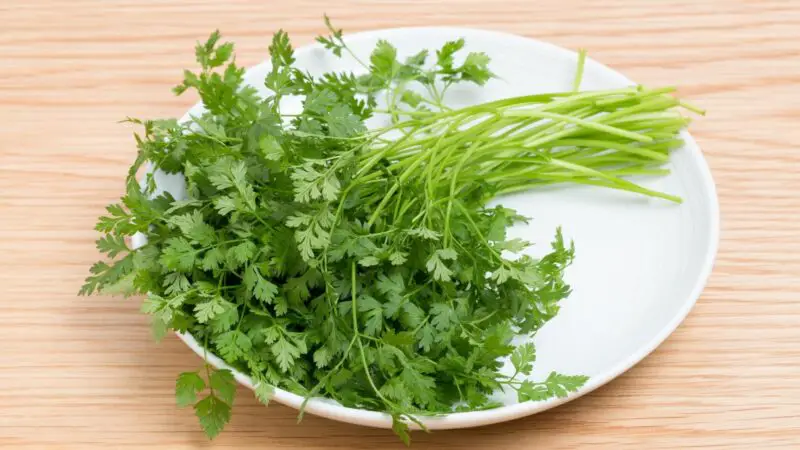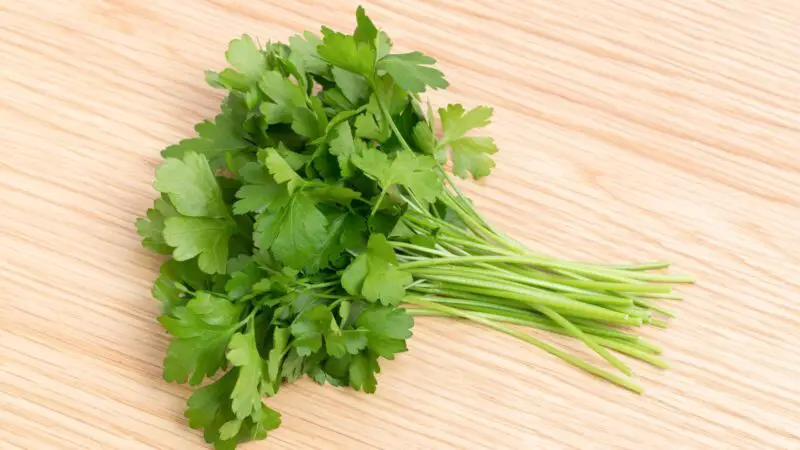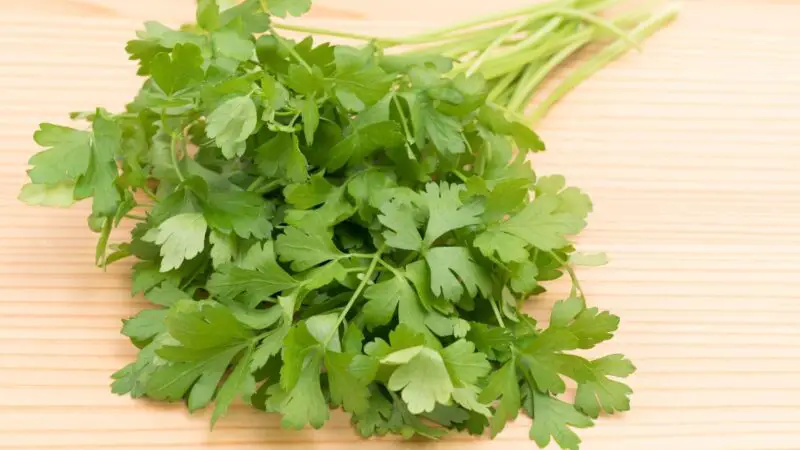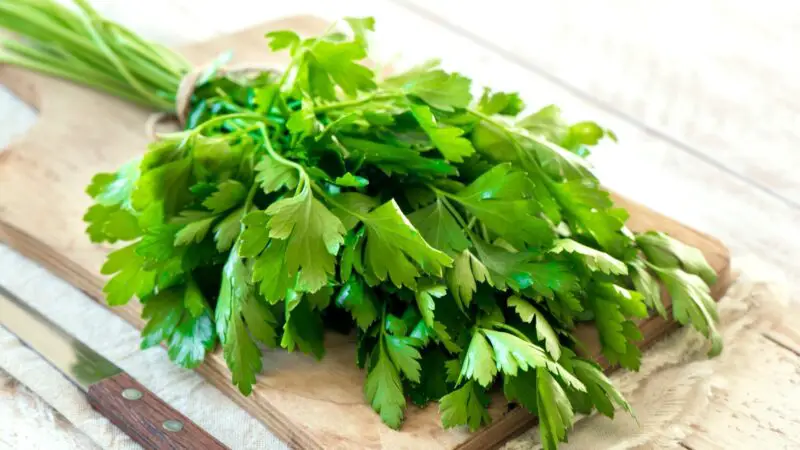Parsley is a vegetable that is cultivated for use as a spice or a herb for cooking. It is famous all over the world and is enjoyed by most people around the globe. Italians, in particular, love parsley and use it in most of their cooking.
Guinea pigs can eat Italian parsley, but it should be kept under regulation. It should not be given in large amounts and should only be fed once or twice every week. Otherwise, this parsley has sufficient nutrients that will benefit your cavy.
Now that you know whether your cavy can eat Italian parsley or not, let’s take a look at other factors related to this vegetable.
Table of Content
Are Italian Parsley Good for Guinea Pigs? | Health Benefits

Italian parsley has a myriad of benefits that your cavy is set to gain through eating them. The following are some of them:
- Bone health. This veggie has sufficient vitamin K, which is integral to bone health. The deficiency of the vitamin often leads to several bone-related complications, which you can avoid by giving your cavy parsley. Besides, this vitamin also helps in the absorption of calcium in the guinea pig’s body, which is useful for bone health and healthy teeth.
- Boosts the cavy’s immune system. If you want your guinea pig to have a healthy life and enjoy a stronger immune system, you need to incorporate this veggie into its diet. This is because green has vitamin C which is a great immune booster. Besides, guinea pigs cannot naturally make or store this vitamin in their bodies, and that is why they need it from an external source.
- Help in the elimination of free radicals. Free radicals are a product of metabolism but can act as a potential danger to your cavy’s health. Parsley has beta carotene in it which is a significant contributor to the fight against free radicals in your pet’s body.
- Contributes to heart health. Folate, which is readily found in the green, helps to fight heart-related diseases and ailments that can affect your guinea pig’s existence.
- Acts as a body detoxifier. Your guinea pig is prone to toxins inside of its body, especially in the kidney. This is where parsley comes in to deal with these toxins and eliminate them in the body. This can also reduce the chances of bloating in your pet and bring down any stomach upsets. Also, for this reason, the green is attributed to the elimination of kidney stones and other urinary-related problems in your guinea pig.
- It aids the digestion process. Due to the presence of dietary fiber in the veggies, your cavy’s digestive process is smoothened to avoid any problems. Also, it helps to cover any issues after digestion like constipation for instance.
- Parsley fights diseases and infections. This green has antifungal and antimicrobial abilities that make it the right remedy for diseases and infections. They can clear all the fungus and bacteria that are present inside your guinea pig thus ensuring that it is healthy always.
- Boosts eyesight. Parsley has vitamin A which is a good source of nutrients needed for good vision and health.
Nutrition Facts of Italian Parsley

Parsley is a nutrient-potent vegetable, and that is why it has so many benefits to your cavy. The following are some of the nutrients found in the green:
- Calcium – This mineral found in parsley is an excellent tool for the development of strong bones and teeth.
- Dietary fiber – Aside from aiding the digestive system, this nutrient also helps in relieving constipation and other stomach-related upsets.
- Vitamin A – Eyesight and the proper functioning of the eye need this vitamin, which is readily found in this vegetable.
- Vitamin C – This vitamin can neither be created nor stored by guinea pigs, and that is why it is needed from an external source such as parsley. It helps in the fight against scurvy in addition to boosting the immune system.
- Vitamin K – This vitamin is useful in bone health and also helps in the absorption of calcium in the cavy’s body.
Are Italian Parsley Bad for Guinea Pigs? | Possible Risks

There aren’t many risks associated with parsley. The following are some of the possible risks associated with feeding your cavy parsley:
- Not ideal for expectant cavies. Parsley has some chemical traits that can affect the way pregnant cavies behave. This way, it is crucial to avoid the greens for guinea pigs that are carrying pregnancies.
- Parsley that has herbicides and other chemicals on them may cause harm to your cavy. Planted veggies are sometimes sprayed with chemicals to keep pests and diseases away. These chemicals may be harmful to your cavy if ingested. That is why it is advisable to rinse the greens thoroughly under running water so that you can eliminate any chances of food poisoning in your little pet. If your pet takes in the green that has chemicals and reacts with it, give sufficient water as you seek advice from the nearest vet.
Can I Cook Parsley for Guinea Pig?
Unfortunately, guinea pigs cannot take prepared foods. They only eat raw vegetables and fruits. If you want to feed your cavy Italian parsley, then that will have to be fresh and natural.
You will destroy any nutrients in the green when you cook it compared to administering it raw. Remember that the main aim of feeding it to the cavy is to offer nutrients to it. Heat denatures these nutrients that are needed by your guinea pig.
How Often Do I Need to Feed My Cavy Italian Parsley?
Just like any other food, you need to regulate the intervals between which you feed the green to your cavy. Once or twice a week isn’t bad, and you can supplement it with other foods available.
How Much Parsley Are Needed for Guinea Pigs?
Make it an infrequent treat rather than a daily treat. A feeding interval of five to ten parsley sprigs is advised. Never use more than 6–9 tiny stems in a single serving. Do not go over this amount because parsley’s high calcium content can be harmful to pigs’ health.
Quick Facts on Italian Parsley

Italian parsley is used by many people at home and in animal shelters. You may probably have interacted with the green severally but didn’t know some in-depth facts about it. If you fall under that group, worry not as below are some quick facts on the vegetable:
- The plant can grow up to 2 feet in height.
- The plant completes its entire cycle after two years have elapsed.
- Parsley has uses in the cosmetic industry where it is used to prepare soaps and lotions.
- Oil from this plant has the possible function of preventing tumors.
- Bad breath is one condition that parsley can eliminate.
- It is one of the most used and most known herbs in the world.
- The plant can germinate for up to one month, which is considerably long.
- Parsley plants can produce flowers though small in size.
- It is one of the oldest herbs ever used by man. It dates back to ancient Rome where it was used as a decoration and as a tool to deal with a hangover.
We have also made a full list of foods that guinea pigs can and can’t eat (150+ Types of Foods). Be sure to also check our recommended products page for everything you will ever need to assure a happy life for your guinea pigs. Hope this information was helpful and you have found the answer you were looking for.
Related: Can Guinea Pigs Eat Parsley? (Benefits, Risks, Serving Size & More)
List of Sources
Caring for Your Pet Guinea Pig
Vitamin C Requirements of the Guinea-Pig
Nutrient Requirements of Laboratory Animals: Fourth Revised Edition
The Effects of Diet on Anatomy, Physiology and Health in the Guinea Pig
